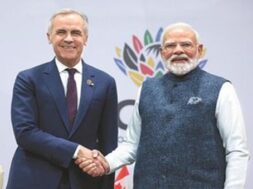
Covid Restrictions Returning in China as Cases Resurge
Manas Dasgupta
NEW DELHI, March 12: In terms of number of daily cases, it was far fewer than the number of Covid infections reported in many countries, but China is experiencing its most significant Coronavirus outbreak since the early days of the pandemic, igniting a flurry of new restrictions and mitigation measures as the country’s zero-tolerance approach to the virus is challenged like never before.
More than two years after the first Covid-19 case was detected in China, the nation is seems be again seeing a resurgence of the cases in comparison to what it had seen in 2020 when the world was in the grip of the pandemic. China reported over 1,500 new local Covid-19 infections Saturday, which was the largest number of case that has been detected since the initial nationwide outbreak at the start of 2020.
China’s 588 daily cases were far fewer than those of many other countries, but the growing number could complicate Beijing’s “dynamic-clearance” ambition to suppress contagion as quickly as possible. Domestic infections topped 1,000 for the first time since the peak of the original Wuhan outbreak on Friday, a tally that has ballooned from just over 300 cases a day in less than a week.
When most other countries have started withdrawing almost all the travel and gathering restrictions they had imposed in the wake of the pandemic two years ago, China is going back to the rigors of complete restrictions. Sticking to its “zero-tolerance” strategy, China on Friday imposed lockdown in the sprawling city of Changchun housing a population of over nine million people and on Saturday many other cities in China have gone back to cancelling events to avoid mass gathering. Mass testing of residents is once again being promoted and face-to-face classes are being cut in school.
Besides locking down Changchun, China also responded to the increasing number of cases by ordering the construction of makeshift hospitals there and in the eastern port city of Qingdao. Authorities are moving quickly to build three makeshift hospitals with a capacity for some 1,200 beds. An outbreak of the omicron variant in Shanghai saw schools there shuttered again, while officials are said to be looking at diverting all international flights away from the financial centre to ease pressure on quarantine hotels. China isolates all virus cases, including those in the community, as part of its Covid zero policy.
As per the information percolating out of China, the north-eastern province of Jilin, one of the hardest-hit regions, said it had dismissed the mayor of Jilin city and a district head in the capital, Changchun. Changchun has ordered all but essential businesses to halt operations, banned residents from coming out of their residences and snapped all transportation links. Similar measures have been applied in urban areas of Jilin city.
In the financial hub of Shanghai, the Disneyland resort said it would reduce its guest capacity and from Sunday require visitors to present negative nucleic acid test results taken within 24 hours. The venue for the Canton Fair, China’s oldest and biggest trade fair, has been temporarily closed as it was recently reportedly visited by a suspected confirmed case, local authorities in Guangzhou said.
In a move that may signal Beijing is fearing a further spike in cases, authorities said late Friday that they would allow the use of rapid antigen tests for the first time. While used widely in other parts of the world, rapid tests were previously restricted in China. China has granted approval to five Covid-19 antigen kits made by local companies to be used for self-testing. China’s National Medical Products Administration published a notice on Friday saying Beijing Huaketai Biotechnology had been allowed to make changes to its Covid-19 antigen test kit’s device certificate.
It published a similar approval for four other companies, Nanjing Vazyme Biotech, Guangzhou Wondfo Biotech , Beijing Jinwofu Bioengineering Technology and a BGI Genomics subsidiary, Shenzhen Huada Yinyuan Pharmaceutical Technology, on Saturday.
The Covid zero tolerance that helped keep the world’s second-largest economy largely virus-free for much of the pandemic now appears to be buckling as the more transmissible omicron repeatedly breaks through its stringent containment regime. Covid’s spread in China’s biggest cities also makes it difficult to deploy the aggressive but disruptive restrictions officials typically turn to rein in cases, chief among them lockdowns.
Still, China on Saturday said it would persist with its Covid Zero policy and try to prevent further spread of the virus. Officials said China’s strict Covid controls should remain and officials need to avoid “war-weariness” in their work.
China famously erected a number of temporary hospitals in Wuhan in 2020, some built in as little as 10 days and then used to treat moderate and severe patients. The country’s policy is still to isolate all cases of Covid, regardless of severity, to contain further spread. That approach will be maintained, according to a person familiar with the country’s plans, and other places that are experiencing strong outbreaks should consider building temporary hospitals, especially to isolate cases with no symptoms. That would leave actual hospitals designated to deal with Covid free for the more severe infections, the person said.
Qingdao is also building multiple makeshift hospitals amid omicron’s explosive spread in a number of schools. Local officials and school heads there have received disciplinary warnings for failing to tame the outbreak. In Shanghai, students up to middle school will return to remote learning from Saturday. China’s aviation authority has asked airlines to nominate alternative ports of arrival for international flights into the city. Officials cited stretched capacity at the quarantine hotels all travellers into China are required to isolate in, and concerns that space may be needed if the outbreak in Shanghai worsens.
While authorities in Shanghai have largely refrained from deploying the sweeping curbs commonly used in China’s smaller cities — such as lockdowns — the growing outbreak there may test the limits of this more targeted response. Just two of the 75 Covid cases reported in the city Friday were in the community, which may explain why authorities haven’t deployed city-wide testing as yet. Bigger cities with sophisticated contact-tracing capacity won’t necessarily mass test as long as the outbreak is considered to be limited and under control. Most of the newly reported infections in Shanghai are among those who have already been isolated for being a close contact of a case.
Despite the swelling outbreak, China is seeing more people infected without obvious symptoms than those who are sickened by the virus — likely resulting from omicron’s diminished virulence and China’s mass vaccination drive that’s seen nearly 90% of its 1.4 billion people fully inoculated with locally-developed shots and more than one-third boosted. Of Friday’s total caseload, 703 were asymptomatic.
In a bid to reassure its citizens, the Chinese Premier Li Keqiang on Friday said the world should be working more closely together to create the conditions for a return to normal life post-pandemic. In a press conference marking the end of the annual National People’s Congress in Beijing, he said officials will work to make China’s response more scientific and targeted, and to maintain the normal functioning of everyday life and supply chains.














